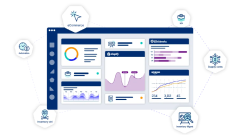
Honing in on the US Market
Cin7’s superior support for bundles allows this Russian seller of guided knife-sharpening systems to offer its customers almost endless product combinations.
The company now known as Gritomatic was born in Moscow, in 2012. At the time, the small family-run business, called RuChef, consisted of just owner Konstantin Martynenko and his wife, Olga, and dealt in kitchenware of all kinds.
After noticing surprisingly strong sales of a particular sharpening system, the pair decided to focus exclusively on the knife-sharpening category: “We sell sharpening tools to sharpen knives, scissors, tools and different blades, but knives are the major aspect of our business,” said Konstantin. “All our customers own knives.”
About half of Gritomatic’s sales are guided knife-sharpening systems made by different brands and half are sharpening stones. While sharpening can be performed freehand, with just a knife and a stone, it requires skill to do correctly, hence the need for guided sharpening systems. “We want to supply many sharpening systems because we feel that there are many new innovations from different countries and different brands.”
The Gritomatic team now includes three more people based in Russia, two in Moscow and one in Irkutsk. “But just because we are small doesn’t make things simple,” said Konstantin. Doing business first in Russia and now in the United States, Gritomatic considers itself an international company.
“If we start discussing Cin7 or similar systems, they have to be compatible with US dollars, euros, Russian rubles. We have to put in the system that we have inventory in different countries. If we have inventory [in Russia], we cannot make it available in the United States because the logistics are very long.”
TradeGecko Not up to the Task
A fundamental lack of flexibility made it impossible for Gritomatic to continue using TradeGecko. “Maybe three years ago, we gave up. We spent a lot of time putting everything in their systems so of course, it was a disappointment for us.”
What kind of problems were they experiencing? As Konstantin explains it, TradeGecko sends the sum inventory of multiple warehouses to Shopify rather than separating inventory by location.
“It was impossible to prevent it,” he said. Why is this such a big issue? “If we don’t have stock of some product [in the US] but we have stock in Russia, we cannot sell it on Shopify because our web store is for American customers. Or if we have some in a warehouse for internal needs, it should not become available on our web store.
“In Cin7, I can say that I want one warehouse to be connected with Shopify and that’s it. I can have a Russian warehouse, I can have a warehouse connected to Amazon FBA. I can have different ones but only one connected to Shopify, and that’s the point.”
FBA as a Stop-Gap
After their split with TradeGecko, Gritomatic relied solely on Fulfillment by Amazon to ship their international orders so they didn’t felt the need for an inventory management system. Then, in 2015, Konstantin and Olga moved to the US and opened a branch in Cartersville, Georgia, 30 minutes from Atlanta. “We wanted to be able to do fast and inexpensive shipping, so we had to be close to a transport hub.”
While FBA had worked well enough for a time, it was also extremely limiting, with “many issues related to customer satisfaction. When you send 10 or 20 orders per month, Amazon is perfect. But when you send a lot of orders, the micromanagement of orders that are lost or delayed becomes very time-consuming.”
Back then, about 80% of their sales came from Amazon and just 20% from their Shopify website, which for Konstantin, felt “very risky.” Deciding it was better to start handling their own fulfillment, Gritomatic opened a warehouse at their Cartersville facility last June.
It was around this time that Konstantin resumed his search for an inventory management solution that was compatible with their new business model. After trying several other inventory management systems, Gritomatic began using Cin7 last September. Now 60% of orders originate from Gritomatic’s own website, with maybe 35% from Amazon and 5% from eBay.
“We tried maybe six systems, and only with Cin7 did we get the feeling that the developers understand what they’re doing. Core Cin7 is fantastic. Our products are about bundles, and the support of bundles in Cin7 is extraordinary.”
Cin7: Best for Bundles
What’s in these bundles? “We sell knife sharpeners and we sell sharpening stones. And there is no one universal stone set, so we offer different stone sets. It’s like a product matrix: You can choose a sharpening system and you can choose a sharpening stone set.”
“[Bundles in Cin7] are implemented so smart that we started to extend the number of our bundles and kits.” When Gritomatic began, they had maybe five bundles, 10 tops. “Right now, we have approximately 100 bundles and we plan to offer maybe 100 or more. I doubt any other system could help us [in the same way].”
Gritomatic carries sharpening systems made in the US, Russia, Ukraine, China and more. “All of these systems can use our sharpening stones. We offer a variety of sharpening stone bundles because people own different knives: everyday carry knives or kitchen knives, hard steel more expensive knives, or soft steel less expensive knives.”
The sharpening stones Gritomatic carries are mostly synthetic, made of diamond particles or more advanced materials like cubic boron nitride, silicon carbide or aluminum oxide, all of which have different properties and costs. They also carry natural stone, though Konstantine describes this as a “very niche” category and rates synthetic stones as superior in every way. “They are more predictive and less expensive to manufacture. They are faster. They are more universal for different materials.”
What’s Next
Russia is Gritomatic’s primary market in terms of sales, but if Konstantin has his way, that will soon change. “We think that our American business will be larger, just because of the economy size.” Production, however, is based in Russia and will remain there, due to lower labor and equipment costs.
As for the future, Gritomatic has big plans: “We want to be the biggest seller of guided knife-sharpening systems.” Konstantin wants people to understand that they don’t have to be confined to proprietary systems like Lansky, the most well-known brand. “Lanksy is okay, but it’s only a few diamonds of different grades and that’s it. You cannot experiment; you cannot try different stones. You just have to stick to the system. All our sharpening systems are not proprietary, so owners of our systems can have access to hundreds of thousands of different stones—not just from us, but from the market.”
Konstantin also wants to improve cost calculations. “That’s one of our priorities. I see how much precision of cost calculations Cin7 can offer, and your competitors don’t do this.” He also wants to make better use of Cin7’s Xero integration. “When we buy, when we sell, when we have a production job, when we have a movement of stock from one place to another. We don’t use Xero for that, but we need to, and we will.”





